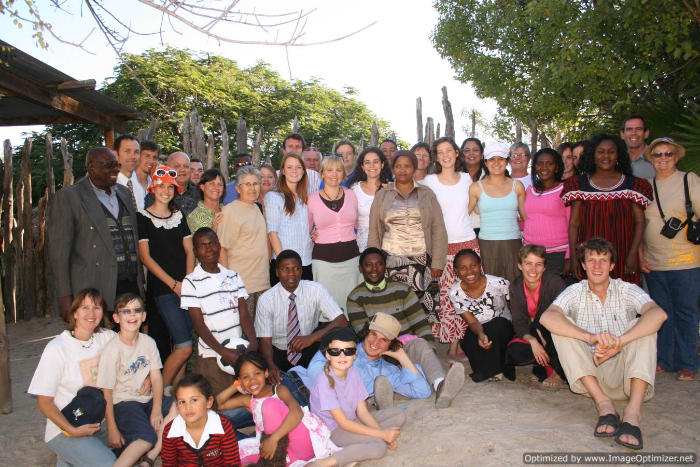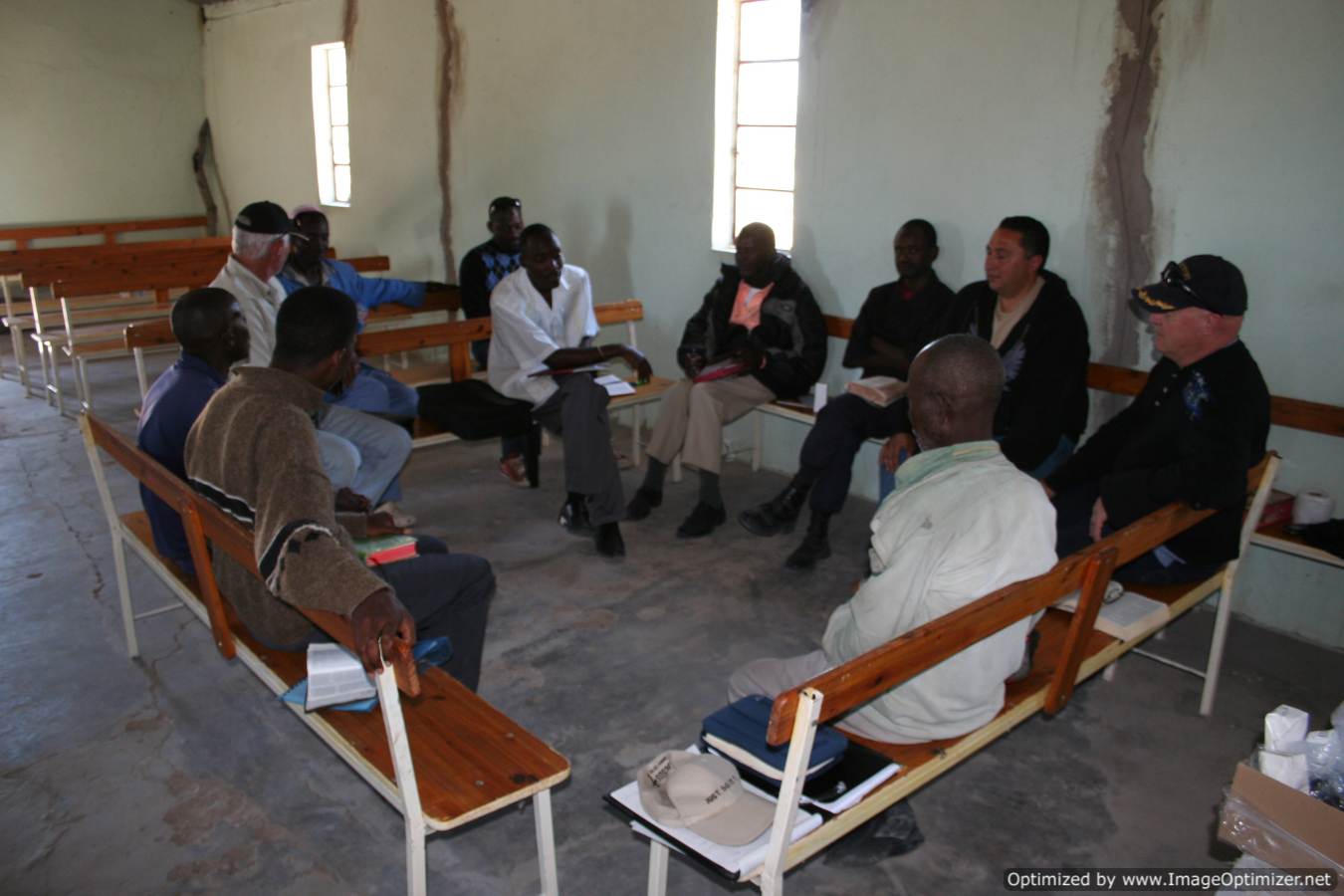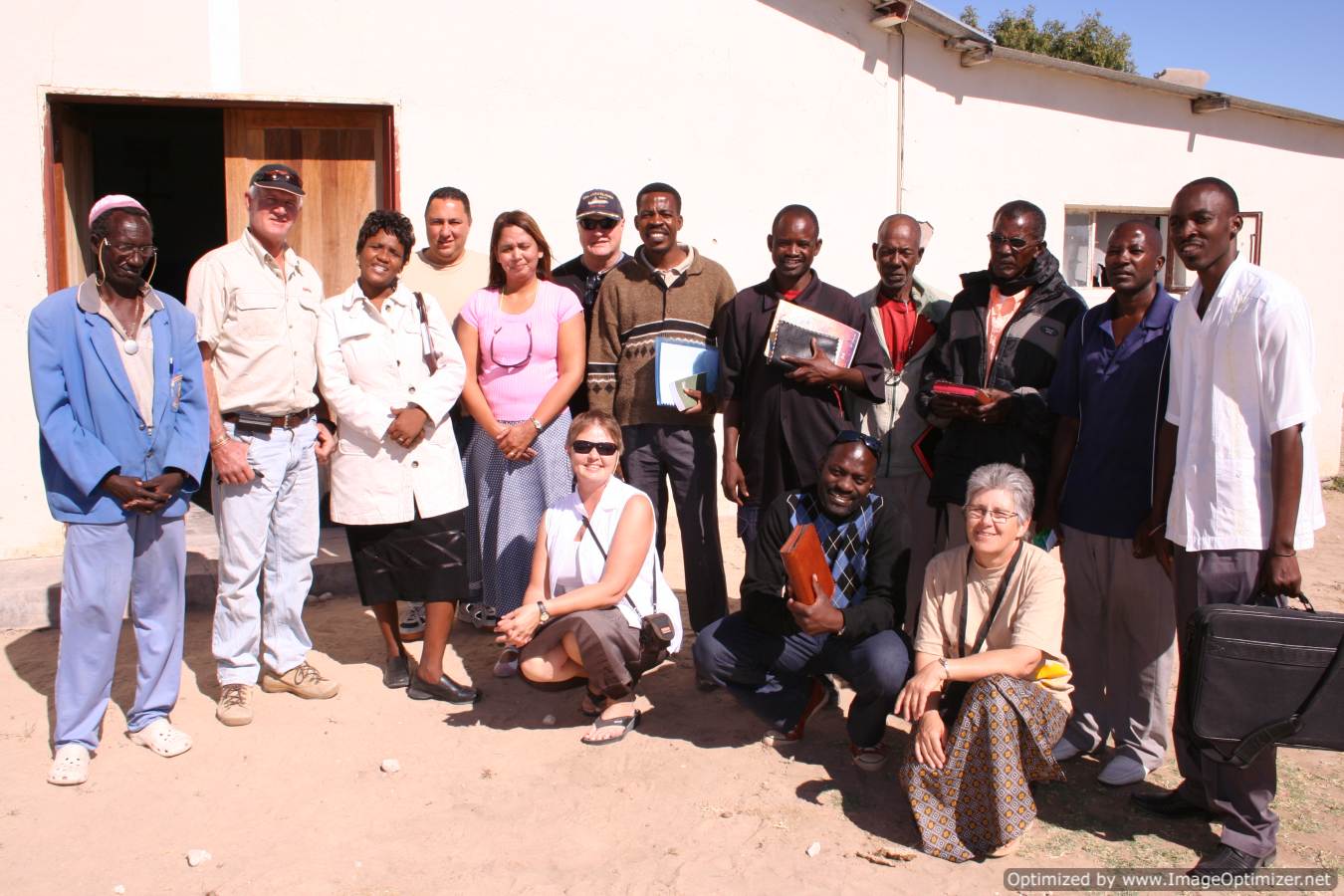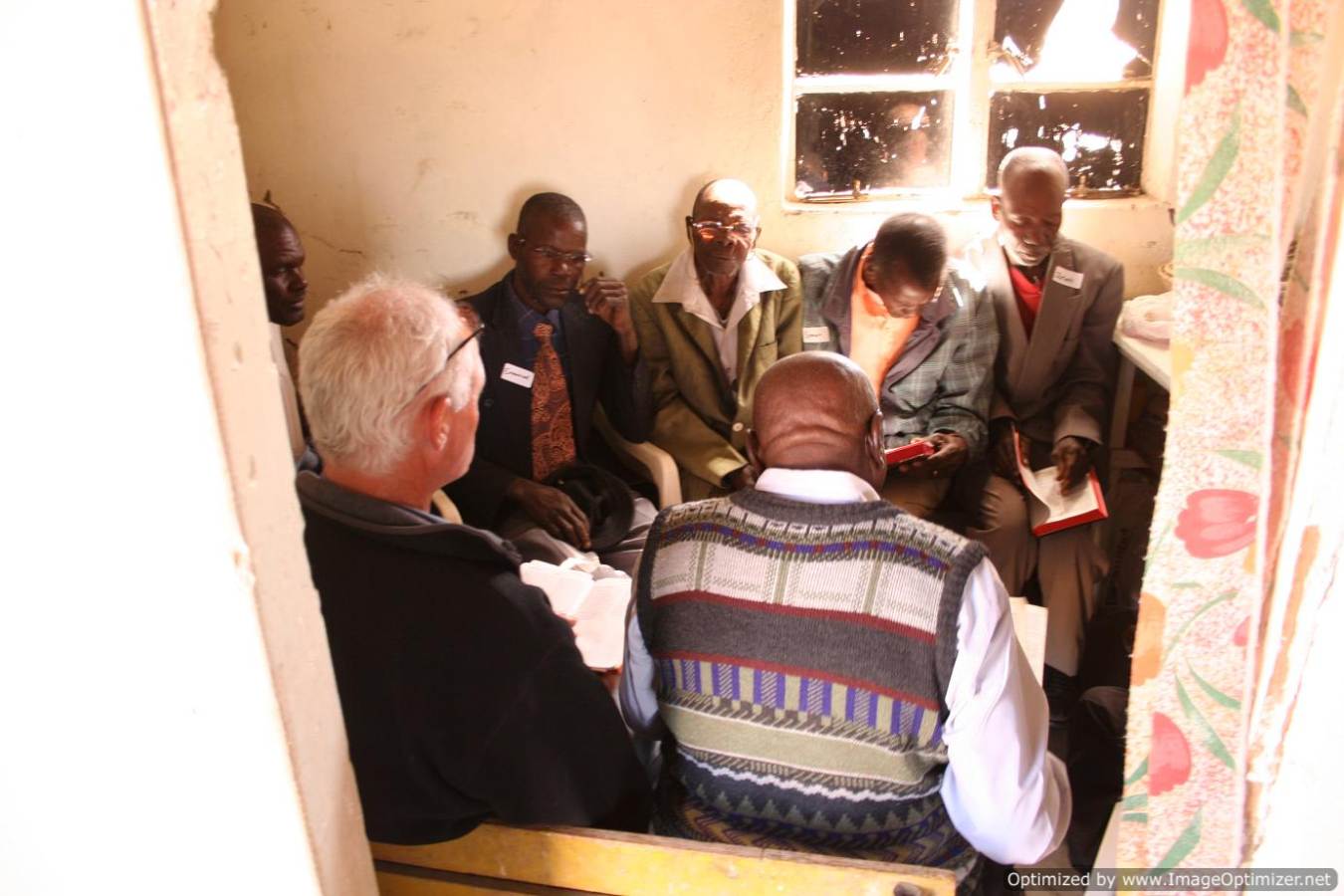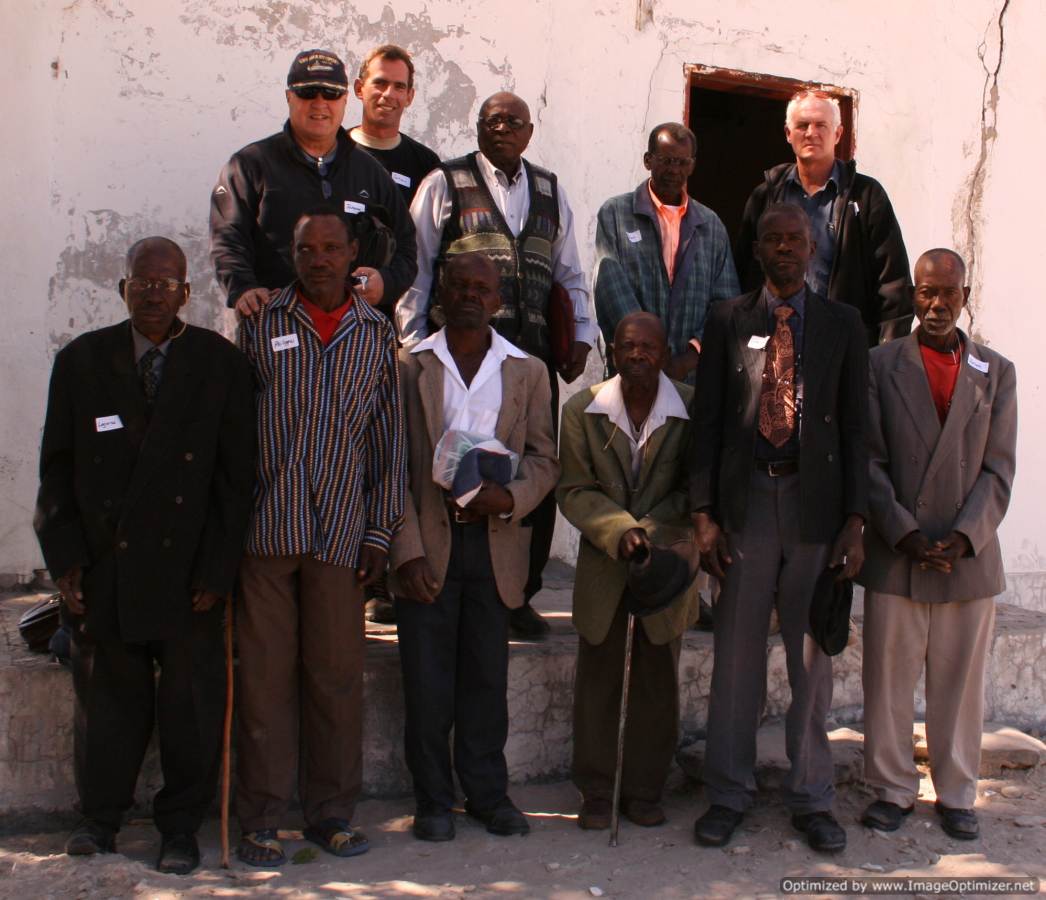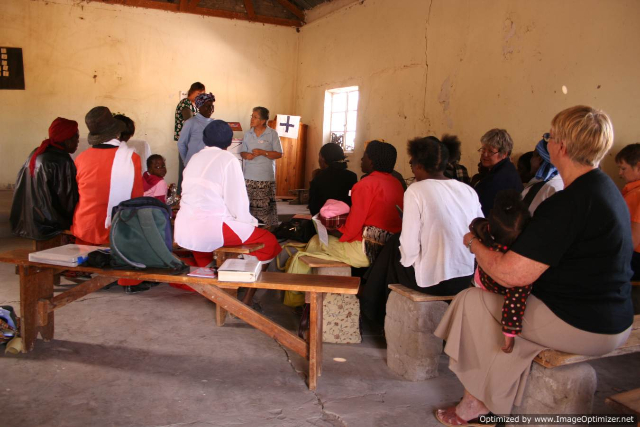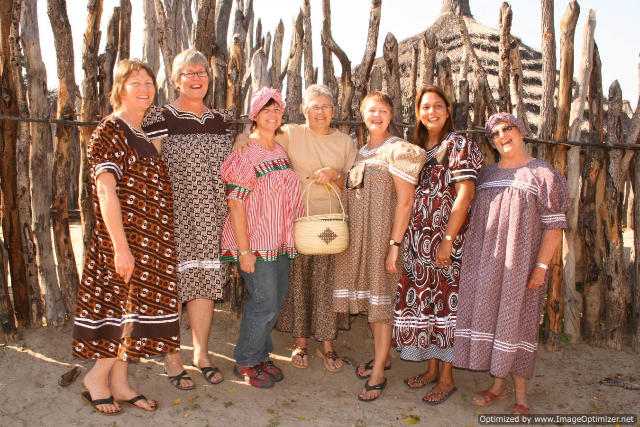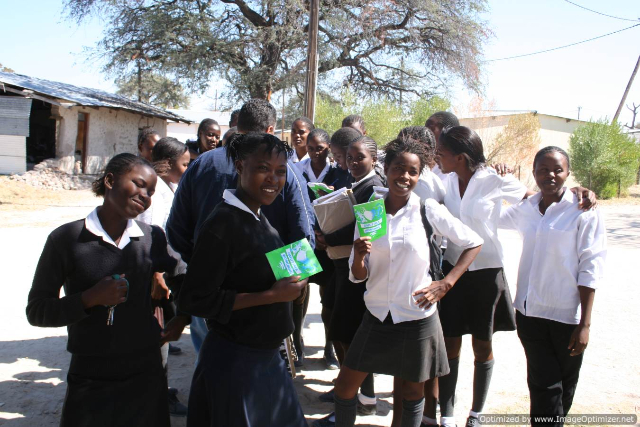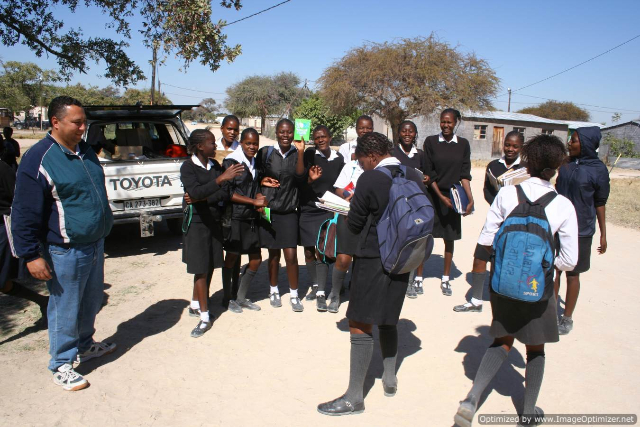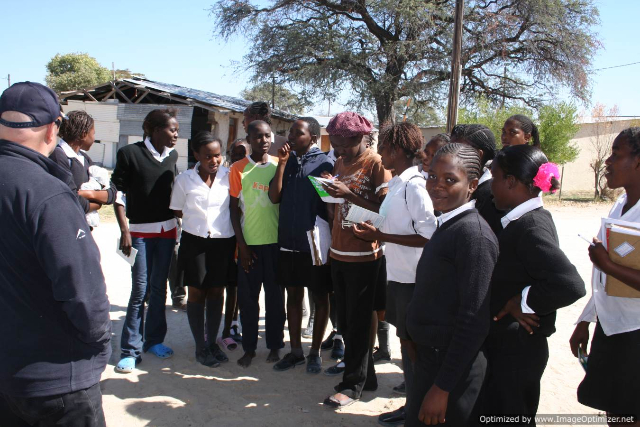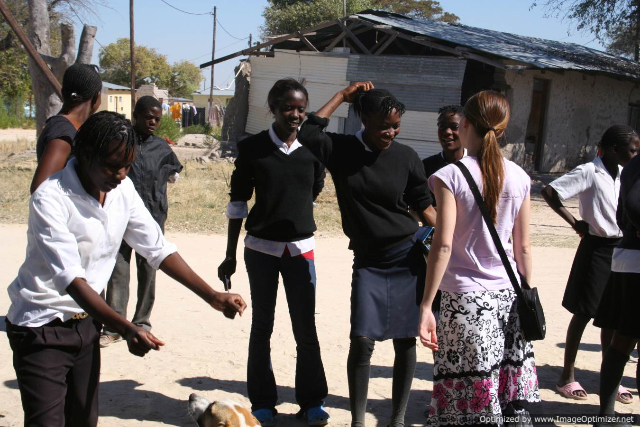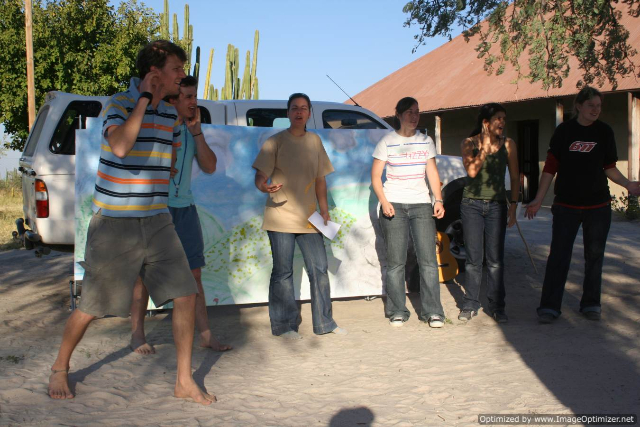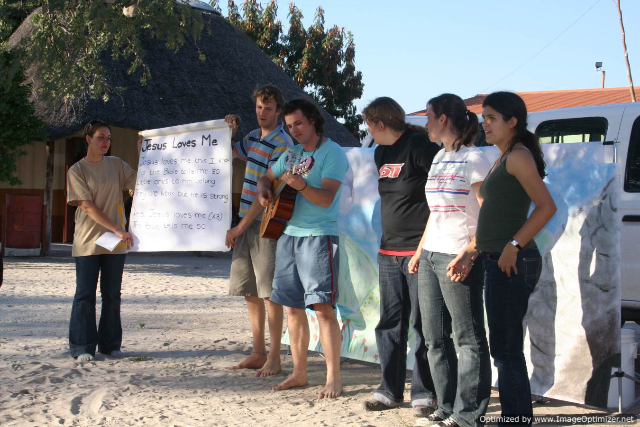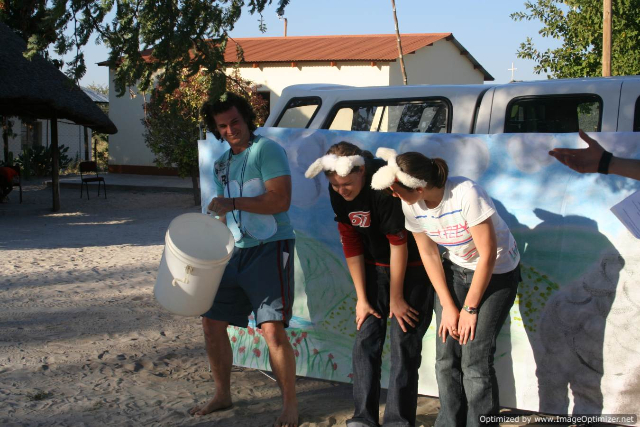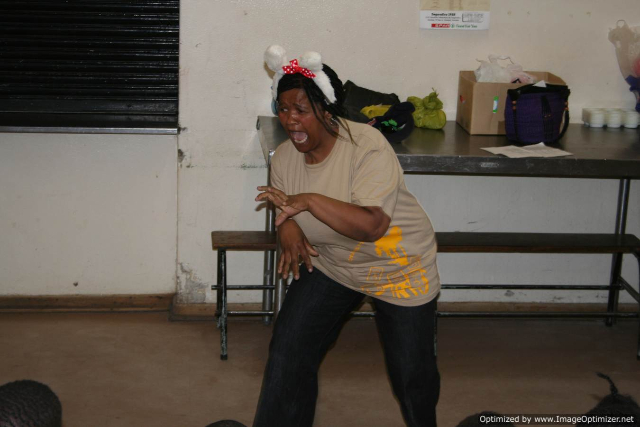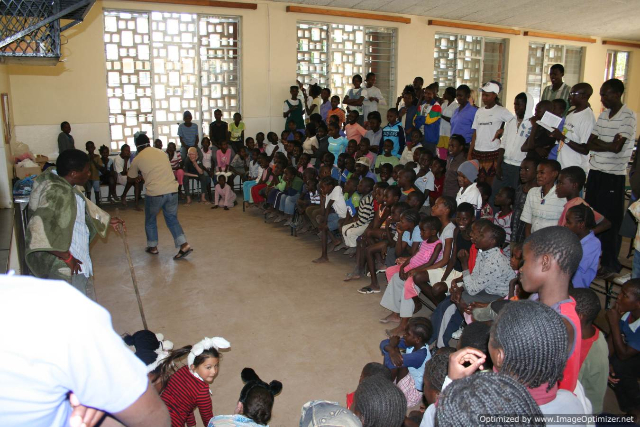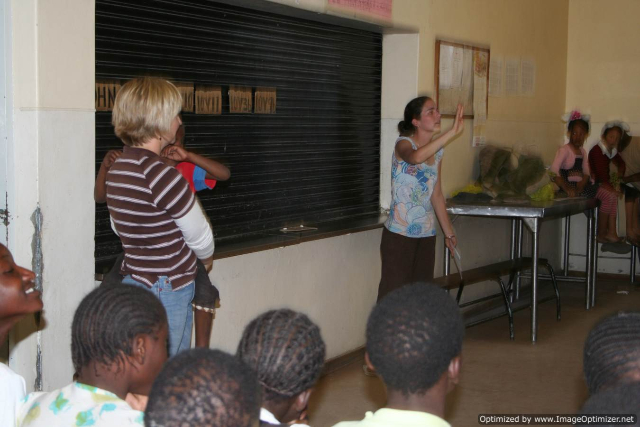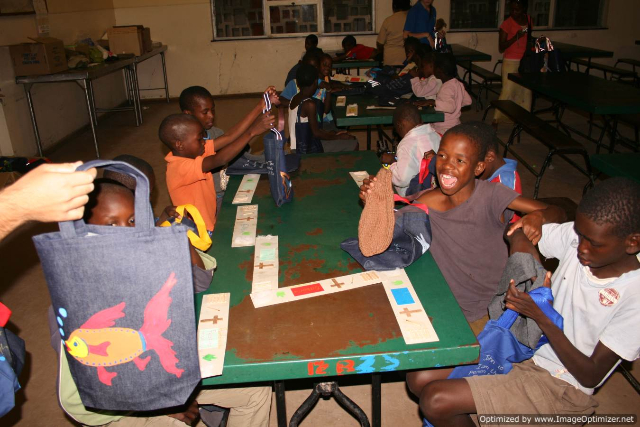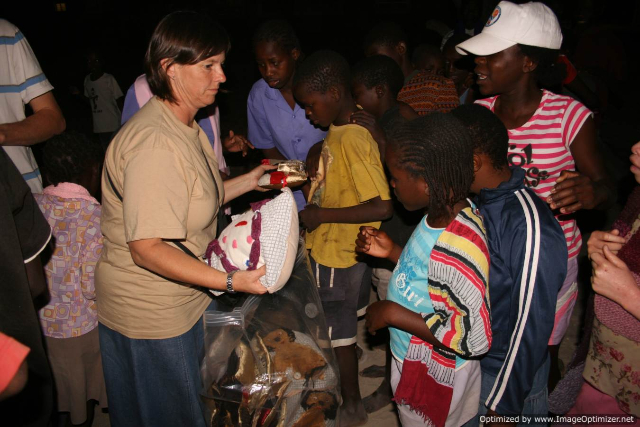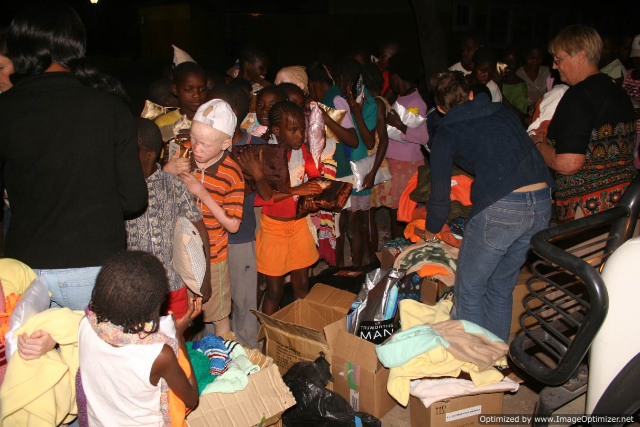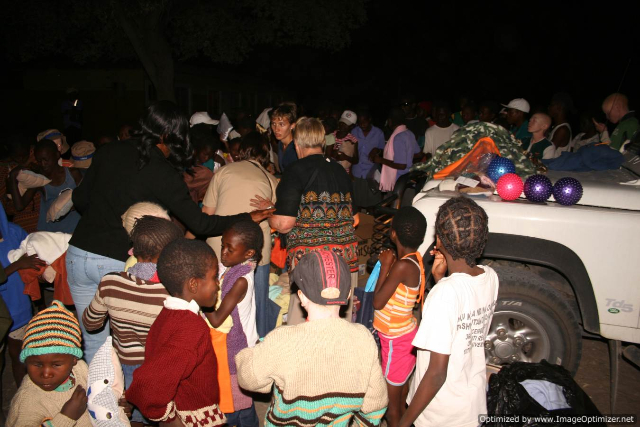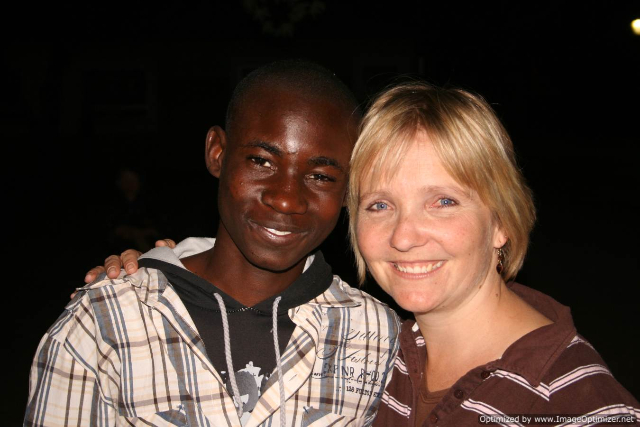These churches included: Christ Church Ondangwa, St. Luke's in Omungwelume, St. Peter's in Onamambili, St. John's at Oshushe and St. Paul's at Ohangwena. It was predominantly the men's and ladies' teams who accompanied Dennis on these visits, and where possible they were joined by the youth and children's teams.
The Men's Team
The men's team from South Africa comprised of four men from different CESA congregations: an ordained minister and three lay men. They set out daily to encourage the men at the various churches by reading the Bible with them, praying for and with them and by challenging them to take up their God-given positions in their homes, church and community. It was especially a humbling experience for the men when they met with the elderly Owambo men and to have shared with them. Some of the men also visited the prisoners at the local prison which is always an inspirational experience. A number of the prisoners are NETTS students whom
David Greeff the local missionary, has been training. These students are doing God's work in the prison. The men also gave practical help to some of the churches. To one of the churches who are suffering with a shortage of income and food as a result of the poor economy and flooding experienced by the Nambians earlier this year the men and ladies were able to provide food that will sustain them for the next few months. The men also helped Dennis restore parts of the building at Christ Church Ondangwa. The church building in Omungwelume is in a serious state of disrepair, but after much prayer and thouqht, it was clear to the men's team that focusing on building relationships with the people who make up that church was a wiser investment.
Johann Coetze Men's Team Leader
The Women's Team
The women's team from South Africa comprised of seven ladies representing five CESA congregations. The ladies were able to keep to the programme set up by Dennis Nandi as well as doing intensive teaching in three of the five CEN congregations. The ladies divided into three groups, each ministering in different congregations as well as in the ladies' prison. The ladies team focused on teaching "The Sinful Heart of Man", an evangelistic tool that has proved to work very well in Africa as it is presented in a culturally accepted way. The ladies at the various congregations learnt about: the sinful heart of man; conviction of sin; repentance; what makes one a Christian; an undivided heart and fruit of the Spirit. At St. Peter's in Onamambili, one of the ladies in answer to a question was able to set out the whole of Two Ways to Live as her understanding of salvation. Several ladies made commitments to the Lord that day. Every year the Christian ladies at St. Peter's are a source of great encouragement. Their commitment to God and the Gospel and their hunger for the Word makes it a privilege and a pleasure to minister to them. At the same time it is also a humbling experience because of the hardship they have to endure. Although two of the ladies went to St. John's at Oshushe for a few days, none of the St. John's ladies arrived so the team then spent time with some of the children and youth. There were only two ladies at St. Paul's at Ohangwena. One of the ladies was elderly and it was impossible to establish whether she was saved. The second lady admitted to backsliding in her relationship with God. A deaconess from the Anglican Church was also ministered to there. Other issue the ladies' team covered were pertaining to the body as the temple of God, living God's way, how to stand strong in Christ during trials and AIDS and the taking of ARV's.
Tish Hanekom Women's Team Leader
The Youth Team
There are three distinctive sections upon which I think it is necessary to report concerning this last trip to Namibia.
What we found
We decided to meet up with a couple of the High Schools that we found near some of the churches. We spent a couple of afternoons waiting near the schools for the teens as they were leaving. It was here that we were able to strike up meaningful conversations. It soon turned out that in some schools, the majority of the teachers were active Christians and were faithfully teaching the Bible in the schools. The High Schoolers that we met had excellent Bible knowledge and were all part of various churches, many of them the Four Square Gospel Churches.
The actual numbers of teens that attended any of the CESA churches in Owamboland was next to nothing. With this in mind we realised that we needed to focus on who was at the churches. This was mostly young adults and some older men.
The one church we decided to focus our time on was St John's which is situated 14km outside of Ondangwa. St John's is regarded by the people in Owamboland CESA churches as one of the more vibrant and active churches. They had a larger number of young adults and high school children in their church. So we spent the remainder of our time teaching every afternoon at St John's, There were about 10 young men and about 8 young women that we met every day. Out of that we can assuredly say that 3 of the young men were impacted and were at least outwardly serious about faith in Jesus Christ. It is unclear with the women, since language turned out to be a huge problem.
What we did
It soon became very clear that we were dealing with either very confused or highly uneducated Christians (if we could even call them Christian realistically). The main approach was to share the Gospel and the implications of the Gospel with them every day in different formats and then being available to answer the many questions that eventually arose.
Some of the issues that we had to teach on was prayer. The question of when to pray was a big one. Many were under the impression that prayer was only for church and was only formalised. It was a huge revelation to them that they could pray at any time and about every area of their lives.
The other question on prayer was the question on who do we pray to? There is a lot of confusion about praying to Mary etc. There was a lot of work for us in correcting these wayward views of praying to Mary and even Mohammed.
The key concept that was misunderstood sadly was that of grace. Many in Owamboland profess to be saved by faith, but in reality live lives that demonstrate a works based religion. Grace is foreign to many of them and the idea that only Jesus can save and not our good works was something we went through on a daily basis.
Many have no idea about the trinity. We had some confusion about why we pray in one sentence to God and then in another to Jesus. The divinity of Christ was misunderstood and he was seen to be just a powerful man.
We used various evangelistic tools throughout our time at St John's. This included many illustrations (picture - cliff; book - transference of sin etc.). We used the heart book which we handed out to everybody that we encountered. We also taught them two ways to live as well as parts of Christianity Explained. The only choice was to teach the gospel again and again in the hope that some understanding would develop.
We were blessed to see progress on our last afternoon there when 8 young men and 9 young women prayed the sinners prayer with the youth team. We must continue to pray for them and support them in every possible way.
One of the most powerful tools for building relationships was sport. We used sport almost everyday, just as a means of attraction and as a means of gaining trust and acceptance. The young people love it and it is a definite tool for teaching further in the Owamboland area.
The way forward
There are two options really. Either we can choose to expand the youth work in general in the Owamboland area and that would mean getting behind and supporting these schools and the Four Square churches who are already doing a great work, or we can choose to grow and expand the CESA churches' youth work in the area. The latter is by far the less 'glorious' and the more difficult of the two. But at the end of the day that is the whole reason we drive all that way every year. We are going there to help these struggling underfed churches and young people. So in my opinion we must only focus on the CESA churches' and their respective youth development if we are going to achieve our real purpose.
The other major facet is that relationships are key. The only way to get through to the people in the Owamboland churches is to gain their trust and acceptance. In my opinion, the youth team should split into various smaller teams maybe two per church and should spend the entire amount of time with the same people. That is how we got through this last time and that is how to continue.
We also need to be asking the hard question of how we can support from South Africa. Many of them do not have Bibles in their own language - we must see what we can do to send them Bibles. We should also aim to have more than once a year's contact with them.
The youth team is still in contact with many of the youth we met up there and we are writing to them and receiving sms's from them. The key is to never do just a 'hit and run' outreach. We must constantly be thinking about long term progress and how each year fits in, as the people we train and develop move through different 'phases' in their understanding of God's word and ministry.
Vaughn Brand Youth Team Leader
The Children's Team
From a children's ministry perspective, our involvement with the CEN congregations was limited. In previous years, for various reasons, we had very little "access" to being able to train and assist those who wanted to do children's ministry. This year, with Dennis Nandi having welcomed all our teams to work in the five CEN congregations, we have had to start from scratch and initiate relationships again. We had very little success in this area this year but the women's team reported that there were some ladies who showed interest in wanting to be trained in children's ministry. We hope that next year will be more fruitful and that we will be able to go into the CEN congregations and train, assist, encourage and support those who have a passion for children and want to work with children in helping them to know Jesus and grow in Him so that we are able to have a long lasting impact when we visit and leave again.
We did, however, have opportunities to run clubs with children in three of the CEN congregations. We would like to work with the church leadership in our CEN congregations and assist them to enrich their cultural norms and help them to make their services more family orientated so that the children can benefit more and be encouraged to enjoy their walk with the Lord.
We spent much of our time working alongside people and organisations from other denominations and affiliations who work with orphans and underprivileged children. This is a great need in Ovamboland and we will be thinking more strategically on how to come alongside these people to help them in a more practical way as brothers and sisters in Christ on this side ofthe world.
We also had several opportunities to train and encourage people from other denominations and in certain schools: a primary school with a Christian principal; a Bible college with twelve students and women involved in children's ministry in the Anglican church. We would like to continue this in years to come as we are eager to help anyone who wants to minister to children.
The children's team also spent a lot of time with the Greeff family who are missionaries based in Oshakati, Owamboland, encouraging them and being their friends as it does get lonely for them at times ... especially for Alisan and the two children, Ettiene and Caris. (Alisan was the Greek lecturer at George Whitefield College a number of years ago and her husband, David, was a student there.) Alisan is being given opportunities to teach the Bible in some of the schools which is very encouraging and she runs a children's club each week from her home. We have and will continue to assist her in this as we provide second-hand books (which helps the children with their English reading) and other resources for these ministries. Alisan also provides training for those interested in children's ministry and we assist her in this when we are there on the mission trip. We do a lot of printing of manuals and provide other resources to assist her in this way throughout the year.
Joanne Cawood Children's Team Leader
The Deaf and Blind Team
Ministry to the Deaf and Blind children and youth at Eluwa Special School in Ongwediva (just outside of Oshakati) has been running for the past five years. There are 236 Deaf and 67 Blind at this school, ranging in ages from four to twenty. It is indeed a privilege and humbling experience being given the opportunity to minister to these unspoilt, loving children. The principal of the school, although uninvolved, is always open to our visits.
Most years we have had the faithful support of one of the teachers of the Deaf at Eluwa Special School who is a Christian, Abraham Nambinga. This year, however, we sadly missed him as he is currently furthering his studies in Zimbabwe. We hope to continue forging our relationship with him at the school in zoao.
This year we taught and adapted the theme of "The Good Shepherd and His Sheep", taken from John 10:1-18 and were able to extract six lessons from this theologically rich passage.
The Blind team have discovered that the best method for teaching the Blind children who have very little understanding of the English language is to get the Blind youth to teach them. The team therefore teaches the lessons to the Blind youth and then work with them to prepare to teach the Blind children. This has proven to be an effective teaching method. Other than that, the language that beats them all has proven to be the language of love and of touch and the team spends much of their time playing with and loving the blind children. Many of the blind youth may be physically blind, but they are certainly not Spiritually blind, and often end up being an encouragement to the Blind team rather than the Blind team being an encouragement to them!
Many Deaf children and teens became Christians on this trip as after each lesson was taught, the team broke up into smaller groups and had time to clarify the teaching and to check on the Deaf children's understanding of the Gospel. The wonderful thing about Sign Language is that it crosses the "language barrier" - The Sign Language dialect used in Namibia may differ in a number of areas from South African Sign Language, but because of the nature of Sign Language we are able to learn each other's dialects with ease, crossing the "language barrier" and are quickly able to communicate with complete understanding. What a privilege to see Deaf child after Deaf child commit their lives to the Lord!
Eluwa Special School has become well supported by our CESA congregations over the years and this year was no exception! In fact, this year topped all the previous years - The ladies from St. Matthews made enough denim school bags for all the Deaf children in the school! With great care, they painted pictures and wrote the key memory verse onto each bag. They also made beautiful cushions for the Blind children and scarves for the Blind youth. The ladies from St. James made beanies, enough for every Blind and Deaf child. Jerseys and fleece jackets were also made and numerous pairs of socks were donated to all the children as well. The children thought it was Christmas when they received their gifts!
The most exciting news that has transpired from this year's visit at Eluwa is that Alisan and David Greeff and their children are now learning Sign Language from the children at the school! Most of the children at Eluwa live in the school hostel and lack parental involvement. Alisan has already had one boy ask her to teach him the Bible, so the hope is that the Greeffs will start playing a key role towards the growth of these young Deaf Christian's lives.
Lisa Harvey Deaf and Blind Team Leader
Thanks
The 2009 "Churches for Namibia" team would like to thank Dennis Nandi, Timothy and Mary (the late Peter Kalangula's daughter) for the way in which they welcomed our team visit. It was a privilege to have worked with them among the people that comprise the various CEN congregations.
